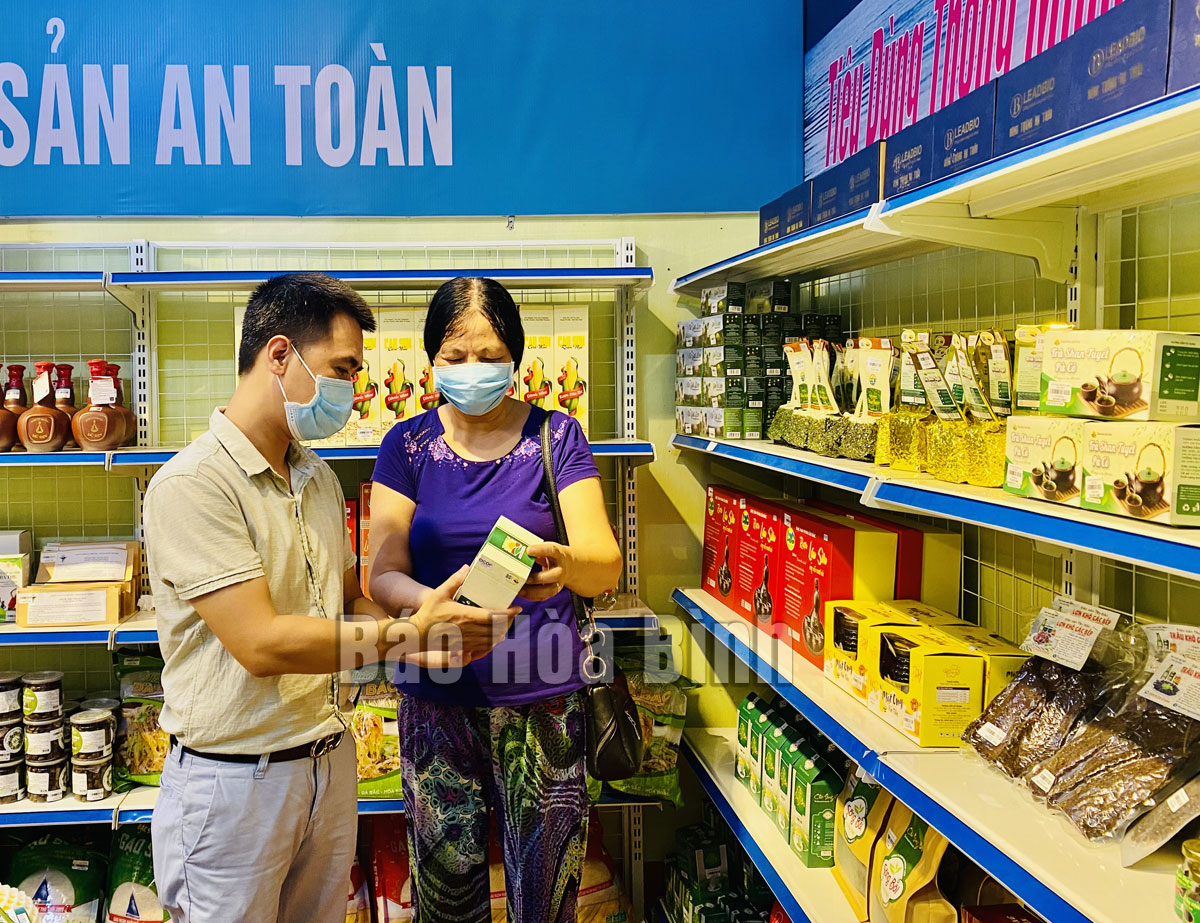
(HBO) - In the period of 2018 - 2020, the One Commune One Product (OCOP) programme has spread throughout the province, mobilising the strength and role of the community in preserving and developing traditional local products, thus breathing a new life into the rural economic sector.

Consumers
choose to buy OCOP products. (Photo taken at an outlet introducing OCOP
products of Hoa Binh at No3, Hoang Dieu Street, Phuong Lam ward, Hoa Binh city).
After three years of implementing the OCOP
Programme, the province now has 70 products of 59 entities recognized by the
provincial People's Committee as meeting OCOP standards of 3 stars or more.
Among them, 18 products got 4 stars and 52 products got 3 stars. Nguyen Huy
Nhuan, Director of the Department of Agriculture and Rural Development, said
the OCOP programme has created a momentum to improve the capacity of craft
villages, cooperatives, small and medium enterprises in production and trade of
particular agricultural, forestry and fishery products of each locality.
Through the standardization of products, the province develops the market for
the products and forms clean and safe agricultural production areas in
association with product value chains, thereby contributing to economic restructuring
in rural areas.
In order for consumers to learn more about
OCOP products, the Department of Agriculture and Rural Development has advised
the provincial People's Committee, the Center for Promotion of Investment,
Trade and Tourism, and related agencies to help business entities introduce
their products on e-commerce sites. The department also arranges for OCOP
producers to attend fairs and OCOP conferences in and outside the province to
have opportunities to access buyers and processors; and coordinates with
departments and sectors to open safe agricultural products stores to display
and sell OCOP products.
Through trade promotion activities, many
OCOP producers have been able to sign sales contracts with supermarket chains
such as Vinmart, BigC, Lotte, Saigon Co-op and clean food stores. Viba bananas
and Cao Phong oranges have been served as desserts on flights of the national
airline Vietnam Airlines; Son Thuy longan is exported to China, and Song Boi
tea is exported to Taiwan...
The province aims to have at least 80
products and services of 15 enterprises, 50 cooperatives, and 15 business
households meet OCOP standards from 3 stars or more by 2025./.
The Standing Board of the Hoa Binh provincial Party Committee has agreed in principle on a proposal by the Standing Board of the Party Committee of Hoa Binh city to gather feedback on the city’s 1:2000 zoning plan, which forms part of its broader urban development strategy.
Hoa Binh province has made notable progress in public administration reform and digital government development, with the satisfaction index among citizens and businesses reaching over 84%, according to recent government evaluations.
Thanks to great efforts by local authorities in recent times, the governance and public administration performance of Mai Chau district has been significantly improved.
In the afternoon of June 6, the Party Committee, the People's Council, the People's Committee and the Fatherland Front of Lac Son district solemnly held a meeting to celebrate the 139th anniversary of the district's founding (1886–2025) and the 79th anniversary of the establishment of the district's Party Committee (1946–2025). There was the attendance of Mr. Bui Van Thang, the Vice Chairman of the Provincial People's Council; Mr. Quach Tat Liem, the Vice Chairman of the Provincial People's Committee; Ms. Dang Bich Ngoc, the Deputy Head of the National Assembly Delegation of the province; as well as the former leaders of the province and district through various periods, who are the natives of the district.
Implementing the Politburo’s Resolution No. 57-NQ/TW on breakthroughs in science – technology, innovation, and digital transformation is a golden opportunity for the northern mountainous province of Hoa Binh to renew growth model, improve competitive edge and shorten digital gap.
Resolution 57-NQ/TW, issued by the Politburo on December 22, 2024, identifies sci-tech, innovation, and digital transformation as strategic breakthroughs to build a developed and prosperous nation. In Hoa Binh province, this spirit is not just a slogan, it’s being put into action through concrete initiatives that form a "new development triangle”: digital citizenship, digital economy, and digital administration.



